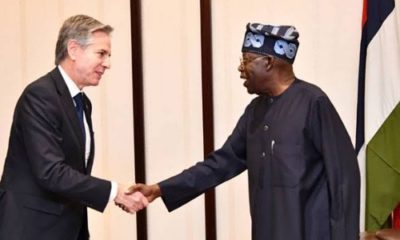Opinion/Feature
CSR in Nigeria: Shell’s intervention in community and economic development

Yemie ADEOYE
“Business has a responsibility beyond its basic responsibility to its shareholders; a responsibility to a broader constituency that includes its key stakeholders: customers, employee, NGOs, government – the people of the communities in which it operates.” – Courtney Pratt, Former CEO Toronto Hydro.
CORPORATE Social Responsibility or CSR as it’s always shortened is a phenomenon that can make or mar any operation or brand in whatever location on the globe. It is a most necessary factor for the sustainability of such operation or brand especially in the location or community that plays host to the brand and its operational service.
CSR is an essential part of most business module across the world, especially for brands that are corporately structured and very dependent on sustainability. This is so because the host countries and communities are a major factor in the survival of the brand and by extension its operations.
 In Nigeria, Africa’s largest economy and most populous country, the story of CSR is almost the same as it is world over, but took different dimension years ago and major international brands and operations came under intense criticism and attacks. But a deeper dive into the waters of community development and CSR activities shows a totally different scenario from what was portrayed by agitators at the time.
In Nigeria, Africa’s largest economy and most populous country, the story of CSR is almost the same as it is world over, but took different dimension years ago and major international brands and operations came under intense criticism and attacks. But a deeper dive into the waters of community development and CSR activities shows a totally different scenario from what was portrayed by agitators at the time.
The Anglo-Dutch giant Shell operates largely in Nigeria since 1937, when it started business as Shell D’Arcy, and has continued to build very strong bridges up to this day. Inspite of some of the negative news about lack of support through CSR, Shell has continued to empower people, communities and businesses across the West African nation with the commitment and focus of a brand that is very focused on sustainability and the future.
In 2019, Shell’s Nigerian businesses (SPDC, SNEPCo and SNG) made direct social investments of US$40 million in Nigeria, making the country the largest concentration of social investment spending in the Shell Group. These investments were recorded in Access to affordable healthcare, Supporting education, Enterprise support, Accelerating access to energy, Assistance and safety etc.
Shell and its subsidiaries in Nigeria have spent US$252 million on community driven programmes since 2006, with over 6000 university grants since 2011. This goes against the narrative that has always made the rounds about international oil companies’ lack of support for Nigeria, especially host communities.
Shell Companies in Nigeria have invested in healthcare and education initiatives in Nigeria for decades and has continued to support a range of programmes not just in the Niger-delta region where it operates, but also across Nigeria. This is achieved via a two-pronged social investment approach.
The first of such is tagged Direct social investment across Nigeria, which focuses on community and enterprise development, education, community health, access-to-energy, road safety and since 2018, biodiversity. The second is tagged Community-driven development programmes and initiatives in the Niger Delta, and this focuses on various themes as determined by benefiting communities and delivered through a Global Memorandum of Understanding (GMoU).
There are 39 active GMoUs in Abia, Bayelsa, Delta, Imo and Rivers States. In 2019,three new GMoUs were deployed and 10 GMOUs renewed. The GMoUs provide a secure five-year funding for communities to implement development projects of their choice. GMoU projects cover community health, education, enterprise development and social infrastructure, such as improved water and power supply, and sanitation. Since 2006, a total of $252 million has been disbursed to communities through these GMoUs.
TOP TEN INNOVATORS IN 2018
In 2018, Nigerian Yolo Bakumor Smith, CEO of De-Rabacon Plastics, won the first-ever Shell LiveWIRE Top Ten Innovators Awards for his business. De-Rabacon is a Nigeria-based plastic recycling and waste management solution company that recycles end-consumer plastics to viable commercial products such as pavement blocks, buckets, cans, and carpets.
“There is often a paper-thin line between success and failure in business, especially for a start-up. The training, support systems and valuable networks I have gained over the last five years courtesy of Shell LiveWIRE, have gone a long way to ensure that my business start-up, De-Rabacon Plastics is thriving,” he said.
“Shell’s approach to supporting local enterprises to grow and excel is enabling us to scale up our business and focus on designing eco-friendly, energy-efficient and affordable products. Today, my organisation employs 16 people and has recycled over 800,000 tonnes of plastic waste. We plan to achieve two million tonnes by the end of 2020.”
HEALTHCARE
The essence and importance of affordable but quality healthcare cannot be overemphasised, as it is a critical enabler to the development and sustenance any community.
It improves health indicators and outcomes and strengthens families, educational attainment and business opportunities.
 Shell has consistently supported community health programmes in Nigeria since the 1980s with equipment and pharmaceutical donations, emergency care and screening services, hospital maintenance and focused interventions on HIV/AIDS, malaria, cancer and vision care. Today, Shell seeks to increase access to health services, introduce health insurance schemes and strengthen health systems.
Shell has consistently supported community health programmes in Nigeria since the 1980s with equipment and pharmaceutical donations, emergency care and screening services, hospital maintenance and focused interventions on HIV/AIDS, malaria, cancer and vision care. Today, Shell seeks to increase access to health services, introduce health insurance schemes and strengthen health systems.
The Anglo-Dutch oil company continues to work with key stakeholders to achieve universal health coverage by increasing access to health and the uptake of services in the communities. The SPDC Joint Venture and SNEPCo supports 20 healthcare centers and signature intervention projects throughout Nigeria.
Health-In-Motion community care programme
Health-in-Motion (HIM) is a mobile health outreach programme that takes free medical services to where People live and work. Funded by the SPDC JV and SNEPCo, it reaches an average of 50 communities annually. In 2019, HIM services benefited 27,490 individuals in Imo, Bayelsa, Delta, Rivers and Ogun States. Since its launch in 2010, more than 667,000 people have benefited from this particular programme.
Community Health Insurance Scheme
The Community Health Insurance Scheme (CHIS) is a partnership between SPDC, Rivers State Government and local communities. The programme aims to provide affordable, quality healthcare to the people of Rivers State.
CHIS was launched in 2010 at Obio Cottage Hospital, a secondary health care centre, just a short walk from the SPDC JV offices in Port Harcourt. CHIS costs individuals $30 per year and covers about 95% of people’s health care needs. Since 2010, more than 67,000 people have been enrolled. In 2019, nearly 8,500 new clients registered.
The hospital has also seen an increase in the uptake of services. For example, the average number of patients using the facility increased from about 600 at inception to about 7,700 per month in 2019, making Obio one of the most utilised health facilities in the region.
This successful pilot has now been expanded to three other locations, highlighting the possibility for extended healthcare coverage in Nigeria.
Oloibiri Health Programme (OHP)
The Oloibiri Health Programme is a Shell-sponsored local government initiative in the Ogbia area of Bayelsa State. It is designed to improve health outcomes in an innovative and holistic way. The initiative included a full refurbishment of the Kolo General Hospital, which was inaugurated in July 2019.
More broadly, the initiative focuses on improving and maintaining health, not just treating illness. It strengthens local healthcare systems by upgrading and integrating facilities, training and supporting local healthcare and community workers and ensuring a reliable supply of medicines.
The programme has seen a five-fold increase in service utilisation to 4,210 patients in 2019 from an average 833 patients in 2017.
It has also provided training for over 130 health workers at community, local and state government levels. In addition to this, it has trained 117 volunteers as facility-based extension workers in house-to-house healthcare.
To anchor the sustainability of the OHP, the initiative aims to establish the Oloibiri Health Foundation that will institute the Ogbia Health Insurance Scheme akin to the scheme in place at the Obio Cottage Hospital.
The scheme will be launched with a one-time contribution from Shell and the Bayelsa State Government. The Oloibiri Health programme included a refurbishment of the kolo General Hospital, which was inaugurated in 2019.
EDUCATION
Over 35 percent of Nigeria’s population falls within the youth demographics. Providing easy access to education for this demographic is critical to the success of the country.
Shell Companies in Nigeria have a long history of supporting education through scholarships and other initiatives. Since the 1950s, the Shell scholarship schemes have supported several thousands of students many of whom are among Nigeria’s business, political and social leaders.
In 2019, the SPDC JV and SNEPCo invested $7.8 million in scholarships. Since 2011, the schemes have awarded more than 9,400 secondary school grants and over 6,000 university grants to students.
Cradle-to-Career Scholarships
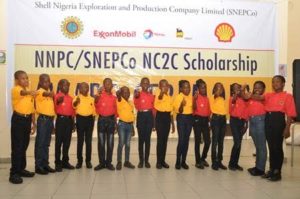 The SPDC JV and SNEPCo invest in the Cradle-to-Career scholarship programme, which pays for children from rural communities to attend some of the country’s top secondary schools. The SPDC JV has awarded a cumulative 600 Cradle-to-Career (c2c) scholarships in the Niger Delta. In 2014, SNEPCo began offering these scholarships to applicants across the country, and so far, 471 students have benefited.
The SPDC JV and SNEPCo invest in the Cradle-to-Career scholarship programme, which pays for children from rural communities to attend some of the country’s top secondary schools. The SPDC JV has awarded a cumulative 600 Cradle-to-Career (c2c) scholarships in the Niger Delta. In 2014, SNEPCo began offering these scholarships to applicants across the country, and so far, 471 students have benefited.
Since 2010, more than 1,000 students have received scholarships. The scholarships cover the full cost of tuition, travel, accommodation, uniforms, books and laptops. Students completing the c2c secondary school scheme also receive support from Shell through the University Scholarship scheme. This support is dependent on them securing admission to a Nigerian University.
Tertiary Education
Lack of world-class research institutions and limited access to technology are key challenges in enabling Nigerians to play an even greater role in the oil and gas sector. Shell invests in advancing education through university scholarships, student exchange programmes and focused research.
Since 2011, the SPDC JV and SNEPCo have awarded more than 6,000 university scholarships. As part of the drive to motivate students and reward the high performers in the University Scholarship Scheme, the highest-achieving students are then also given the opportunity to participate in the SPDC JV Students Industrial Work Experience (SIWE) programme.
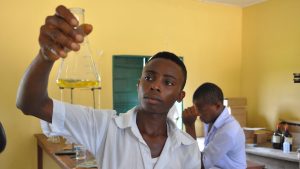 The SPDC JV also established the Shell Niger Delta Post Graduate scholarship programme which has benefitted 92 students from the region over the last decade. The programme offers one-year scholarships to three UK universities for studies related to the oil and gas industry.
The SPDC JV also established the Shell Niger Delta Post Graduate scholarship programme which has benefitted 92 students from the region over the last decade. The programme offers one-year scholarships to three UK universities for studies related to the oil and gas industry.
To promote the emergence of industry-ready graduates at university level, Shell also invests in specific initiatives at Nigerian universities.
The SPDC JV, in collaboration with the University of Benin, funds a Centre of Excellence (CoE) in Geosciences and Petroleum Engineering and has more recently (in 2017), collaborated with the Rivers State University to set up a CoE, which specialises in Marine and Offshore Engineering.
The CoEs offer specialised post-graduate degrees in Geosciences, Petroleum Engineering and Marine and Offshore Engineering respectively. Each programme lasts for 18 months and culminates in a six-month internship with an oil and gas company, some within Shell. By the end of 2019, over 75 students had graduated from the programmes and over 81percent of these graduates are currently employed.
ENTERPRISE SUPPORT
Shell works to improve the chances for Nigerians to achieve their ambitions. In addition to providing access to loans, and to small and medium businesses, which could become Shell suppliers and contractors, there is also the ‘LiveWIRE’ youth enterprise development programme.
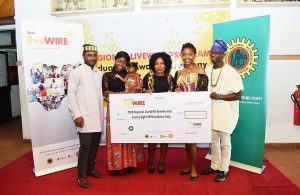 ‘LiveWIRE’ was launched in Nigeria in 2003 and provides training and finance to young people between the ages of 18-35 to start or expand their own businesses.
‘LiveWIRE’ was launched in Nigeria in 2003 and provides training and finance to young people between the ages of 18-35 to start or expand their own businesses.
In 2019, 140 people benefitted from the ‘Livewire’ programme, receiving training in enterprise development and management, as well as business start-up grants. More than 7,000 Nigerian youths have so far been trained under the programme and almost 4,000 young entrepreneurs were provided with business grants.
Two Nigerian enterprises were shortlisted in 2019 for the Shell Global Top Ten Innovators Awards, A global competition that highlights and rewards businesses that demonstrate excellence in innovation as well as giving entrepreneurs a chance to shine on a global platform.
The enterprises were FarmToJuice and Foods Nigeria Ltd “FarmToJuice” and Basiled Energy Ventures. FarmToJuice produces juices, processing any waste into livestock feed and using a biogas digester to provide energy. Basiled provides solar lamps, solar installation maintenance and repair and solar battery recycling services.
Shell “LiveWIRE”
Every year Shell ‘LiveWIRE’ supports thousands of individuals to access the knowledge, skills, networks and resources to turn their business ideas into successful enterprises, which provides sustainable income, create jobs and drive innovation.
The purpose of ‘LiveWIRE’ is to improve opportunities for young people to realise their potential through the creation and development of their own businesses.
Such businesses will contribute towards a more buoyant economy and communities with more fulfilled young people.
‘LiveWire’ in Ogoniland
In 2014,Shell extended the LiveWIRE initiative to Ogoniland despite the SPDC Joint Venture no longer producing oil and gas in the area.
The multinational oil company was only aimed at helping to raise the living standards and reduce crude oil theft in the area through the promotion of sustainable alternative livelihoods. This was in line with one of the recommendations of the 2011 United Nations Environment Programme (UNEP) Report for the restoration of the Ogoni environment.
In 2018, 100 Ogoni youths from communities near the Trans Niger Pipeline participated in training with 80 top performing trainees receiving business start-up funding amounting to more than $90,000.
In 2019, the Ogoniland programme gave way to a livelihood programme led and executed by the Hydrocarbon Pollution Remediation Project (HYPREP), an agency established by the federal government and to which the SPDC JV contributes funds. The programme will train 1,200 Ogoni women in various skills and is another initiative appreciated and fully supported and funded by Shell.
Assistance and Safety
These are two critical areas that the company has placed high emphasis. Shell Companies in Nigeria understands their responsibility when it comes to providing support for humanitarian and safety programmes, such as those providing relief to displaced persons or training for emergency workers.
Humanitarian Assistance
For many years, Shell has sustained a culture of care by supporting humanitarian programmes in Nigeria to save lives, especially during crisis and disaster.
In 2017, a contribution of more than $3 million to the Mercy Corps and Family Health International programme benefitted over 70,000 displaced persons in North-eastern Nigeria.
Then in 2018, SPDC provided relief materials worth $1 million to communities hit by floods in the Niger Delta and two other severely impacted states in the country.
Road safety and fire fighting
In 2019, SNG continued to demonstrate its 1 commitment to road safety in Nigeria by extending existing collaboration with the Federal Road Safety Corps in Ogun State to Rivers State. The campaign has held 26 road safety awareness events and reached more than 5,000 people since its launch in 2007.
SNG also held a one-day hydrocarbon training for fire fighters from Abia and Ogun States to further strengthen their capability.
Humanitarian Relief in the North East
Since 2018, SPDC and SNEPCo have committed $6 million to the government driven strategic intervention projects for Internally Displaced Persons (IDP) in Yobe and Borno States. The projects focus on immediate relief and critical support development related to health, water and sanitation, education and shelter.
By the end of 2019, the SPDC JV and SNEPCo completed the distribution of food, essential hygiene kits and other relief items to over 5,500 vulnerable households in IDP camps and impacted communities. SPDC also commenced project work on school reconstruction, and teacher training, upgrading of a Primary Health Care Centre and water and toilet facilities in Yobe State.
Access to Energy
Enterprise development, opportunities for education and access to affordable healthcare hinge upon being able to have reliable and cost-effective energy.
Shell aims to provide a reliable electricity supply to 100 million people, primarily in Africa and Asia by 2030. Nigeria features in that vision.
Despite its oil and gas resources, Nigeria has one of the highest levels of energy poverty in the world7. In addition to investing in Nigeria’s gas development and distribution network, Shell has established “All On” to boost off-grid supply to homes and small businesses in the Niger Delta.
All On, an impact investing company became operational in 2017 and is an independent Nigerian company that works with partners to increase access to commercial energy products and services. In December 2019, Shell made a significant additional long-term financing commitment to All On.
Off-Grid Energy
In an Interview with Dr. Wiebe Boer, a Yale alumni and CEO, All On he observed that Nigerians deserve more reliable energy, especially with its richly endowed location. “Positive change is coming. Already All On has invested in 21 off-grid energy companies and two funds, leading to 21,000 new connections for low-income households and businesses. The journey is just beginning”.
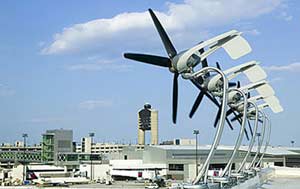 He stated further that the approach being deployed by his company is to get energy across to Nigerians. “Today, grid electricity can be unreliable and back-up generators are expensive and noisy. We help finance businesses that use emerging clean energy technologies to support the creation and growth of sustainable off-grid energy businesses for urban and rural customers.”
He stated further that the approach being deployed by his company is to get energy across to Nigerians. “Today, grid electricity can be unreliable and back-up generators are expensive and noisy. We help finance businesses that use emerging clean energy technologies to support the creation and growth of sustainable off-grid energy businesses for urban and rural customers.”
Affordable and available energy does change lives, and school children can do their homework, agriculture products can be processed and preserved, businesses can thrive, hospitals and schools can also function.
Inspite of these positive possibilities there still exists enormous but very surmountable challenges to the realisation of affordable and available energy.
“About 75% of Nigerian households and small businesses are either off-grid or have poor-grid connection. The scale of the energy access gap in Nigeria is a formidable and urgent problem. My challenge is how do I execute fast enough to make a significant impact without compromising on safety, quality, or anything else” he enthused.
All On invests in off-grid energy solutions spanning solar, wind, hydro, biomass and gas technologies that complements available grid power across Nigeria.
It also aims to help create a more enabling environment for start-ups and to provide them with low-cost financing. In 2019, All On executed an innovative financing instrument with Renewvia to provide affordable access-to-energy solutions.
Through this financing, at least eight mini-grids with a target capacity of 900kW will be installed in various communities. Working with Breakthrough Energy Ventures, Norfund and ElectriFi, All On also participated in the $9 million equity-financing round in Arnergy, which has enabled Arnergy to scale operations and provide solar energy systems for 1,500 small and medium-sized enterprises.
Conclusion
It is obvious from the above that while there continues to exist a massive infrastructural deficiency in the Niger-Delta and across Nigeria, Shell as an operational brand in Nigeria since 1937, and like any other responsible organisation, has been very involved in nation building through its consistent and far reaching Corporate Social Responsibilities, CSR, not just in the Niger-delta where it operates, but as far as the North-eastern region of the country, where it has zero operations.
For organisations and brands still considering and weighing the importance and place of CSR in their modus operandi, it is instructive that they take a cue from Shell by reading up on the CSR story of the Anglo-Dutch oil giant in Nigeria.
Opinion/Feature
GTI: Burden Bearer For NPFL Development

By Andrew Ekejiuba
In one of the famous quotes of Greek mathematician and inventor, Archimedes, regarding the Law of the Lever, he said, “Give me but one firm spot on which to stand and I will move the earth.”
According to history, every generation of humanity has always struggled to invent or re-invent something beneficial to society thereby leaving a legacy behind for posterity to remember them. Be it in business, technology, sports and education to mention but a few, the story remains the same. It was this same vision to accomplish something for Nigerians that also got GTI Asset Management and Trust Limited (GTI) to commence a tedious journey to restructure and reposition our Nigeria Premier Football League.
As noted earlier in this serial, GTI needed to salvage an almost hopeless situation in the history of Nigerian football thereby creating that spot in history according to Archimedes in which the investment banking firm stood to move our beautiful game to the next level.
To kick-start the process, an epoch-making event was held on March 22, 2022, when GTI officially announced its magnificent entry into Nigeria’s football ecosystem following its successful launch of The Nigeria Football Fund (TNFF).
However, immediately after the launch, the entire financial and sports management experts of GTI Group never looked back in ensuring that the huge dream they have for our elite football comes to fruition. From their findings, it was clear to GTI that there were fundamental issues lacking in Nigeria’s elite league prior to their engagement as strategic partners to the NPFL. Notable among them were the issues of sustainable liquidity and reliable transparent structure that can stand the test of time. Other discoveries were poor playing infrastructure; lack of visibility of the League matches and low officiating integrity.
TNFF was aimed at building a “Football Economy” for the transformation of the sports sector. Aside from the aforementioned, the Fund promotes an investment culture among sports enthusiasts and investing public with an opportunity for them to earn returns from their investment. The multiplier impact will drive a cycle of growth (value-chain effects) across several other sectors like Tourism, Broadcasting, Technology, Gaming, Media, Hospitality, Transportation and Merchandising to mention but a few. The end result of these surely will lead to increased economic activities, increase in employment opportunities, rise in disposable income and significant contribution to GDP.
With less than two years of the existence of TNFF, a common question, “Wouldn’t you rather invest in TNFF” has kept reverberating in the minds of interested investors.
Today, the NPFL is currently enjoying relative peace because of the way and manner financial issues are transparently handled in the administration of the league.
On the issue of visibility of the elite league, GTI as burden bearer secured the services of Propel Sports Africa at the end of the 2022/2023 season to ensure our matches are viewed on mobile devices locally and globally on the OTT platform. This singular action attracted more sponsors to the NPFL as they saw the elite league as a veritable product that has the capacity to add value to their products and services. Then, a few weeks into the 2023/2024 season, telecommunication giants MTN and StarTimes followed suit to enhance the broadcast of league matches.
In terms of officiating the NPFL matches, one can comfortably say that there is a remarkable improvement in this regard.
In summary, the management of the NPFL has improved tremendously, thanks to the effort of GTI as strategic partners. Therefore, the journey of taking the league to greater heights is being pursued vigorously as football stakeholders and analysts in the country anticipate that in the next few years, NPFL will become the best-organized league in Africa and also rank among the most glamorous leagues in the world.
The effect of the partnership and support of the Honourable Gbenga Elegbeleye-led NPFL Board has shown a positive trajectory in the latest ranking of NPFL by the International Federation of Football History & Statistics (IFFHS) for 2023. The position of NPFL has improved from 77th to 73rd in the world ranking and has also moved from 10th to 7th in the African ranking. It is expected that the ranking will continue to improve yearly in view of the various efforts made to transform the league.
The time is now for corporate Nigeria to secure sponsorship deals with the NPFL and for the public to invest in TNFF and earn alpha returns on their investment. This is an opportunity to participate in the shared dream to transform our football ecosystem for mutual benefits.
Ekejiuba, wrote from Lagos Island
Opinion/Feature
In Eight Months Of Tinubu’s Administration, Nigeria’s Stock Market Leads Globally
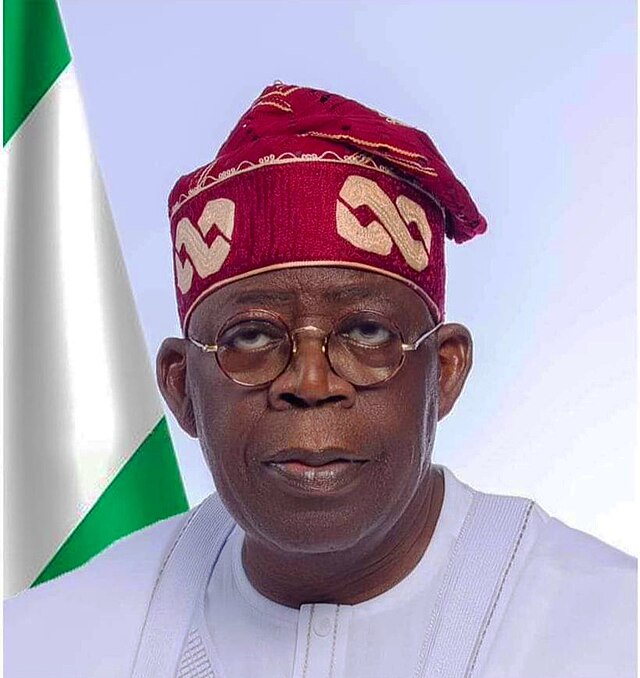
By Bayo Onanuga
The Nigerian economy is looking good in some sectors.
This is not a harebrained assessment, despite the high inflation and the unstable exchange rate of the Naira. Those who doubt this don’t need to look far, for a reality check.
The economic boom is happening at the Nigerian Exchange, where stockholders are not only recording unprecedented capital gains, but are poised to earn equally unprecedented dividends on their investments. The prosperity promised by President Bola Ahmed Tinubu during the campaign is becoming a reality, for millions of Nigerian investors, among whom will be the 6.6 million Nigerian shareholders of MTN, the biggest telco in the country.
The upswing in the market began 30 May 2023, the second day Tinubu was sworn into office. What triggered the big rally in the market was the announcement by the new President of the end of the fraudulent petrol subsidy regime. The market took notice of this bold measure, along with the President’s promise to harmonise the exchange rate. Although the latter remains ‘work-in-progress’, it has been a bullish run in the market since then.
The All Share Index which tracks the general market movement of all listed equities on the Nigerian exchange was 55,738.35 on 30 May 2023, a day after Tinubu was sworn in. In July it rose to 65,091. By 24 December, it reached 73,768, which as Bloomberg reported on 1 November, when the ASI first crossed the 70,000 mark, was the highest on record.
As at the close of trading on Friday 19 January, the index leapfrogged to 94,538.12, more than 69 percent growth, since last May, creating yet another huge record.
Market capitalisation also grew exponentially from N30.3 trillion recorded at end of May 2023 to N51.7 trillion on 19 January 2024. This means investors have gained more than N20 trillion since Tinubu came into office.
The record gains have made the Nigerian Stock Market the best in the world, outperforming the MSCI Emerging Markets Europe, Middle East and Africa Index.
Not surprising, investors are bringing more and more money to the market. Last Friday alone, 844.4 million units of stocks valued at N15 billion were traded in 15,255 deals.
The phenomenal growth of the market was fuelled by the record profits announced by many Nigerian banks and some of the manufacturers, such as Dangote Cement, Bua Cement, Lafarge Africa, formerly known as WAPCO.
The banks were the first to rally the market into a frenzy, beginning from their second quarter reports, when they reported huge gains from their forex dealings. Zenith announced earnings per share in H1 at N9.29 from N3.55 in the same period of 2022. UBA’s earnings per share stood at N10.95 in H1 2023 from N1.98 per share in the same period of 2022.
The positive Q3 reports also threw the market into more frenzy as banks announced further increases in profits. Investors, in response lapped up the shares of the banks, sending the prices higher.
UBA Plc which at the beginning of 2023 was trading at about N8 has seen the biggest jump in its stock price. By last Friday, it traded for N32. Access Bank which started the year at about N11-N12, has soared to N29. Zenith and GTCO are now trading in the N40s, from about N24-25 in January 2023. First Bank , FCMB, Fidelity, Sterling, Wema, Stanbic have all experienced the upswing in prices.
Dangote Cement, Bua Cement and Bua Foods, Flour Mills of Nigeria, Okomu Oil, Presco, Transcorp, NAHCO and WAPCO have similarly experienced some boom. Dangote on Friday, sold for N538, adding N48.9 to its weight, from its previous close of N489.9. WAPCO, otherwise known as Lafarge Africa traded at N31 in December. On 19 January, it traded for N47.
The rise in stock prices is being propelled by investors who are taking positions, according to EDC Securities Research, ‘in fundamentally driven stocks as we approach the earnings season”. The expectations and sentiments out there among the investors are that some dividend windfall is on the way.
The prosperity promised by the Tinubu administration may not be felt by all our 200 million people simultaneously. But it will not be far away as the government confronts the low inflow of forex into the economy, the fundamental reason exchange rate has gone bonkers and prices of imported and locally produced goods have increased.
President Tinubu and his cabinet expressed concern about the rising costs of pharmaceutical products at the last Federal Executive Council meeting. His government is poised to implement a series of measures to assist local drug manufacturers so that they lower the costs.
To address the low forex inflow, Nigeria is discussing as much as $1.5 billion of World Bank funding support for the budget, Finance Minister Wale Edun said in a Bloomberg Television interview. The country is also looking forward to the fulfilment of the pledge by Saudi Arabia to invest billions of dollars in our economy.
The NNPC Limited in the coming weeks will continue to be under pressure to bring in more dollars into the country’s foreign reserve to boost dollar availability and overturn bleak predictions for the national currency in 2024.
*Onanuga is the special adviser Information and Strategy to President Bola Tinubu.
Opinion/Feature
For Aketi, I’m Pained
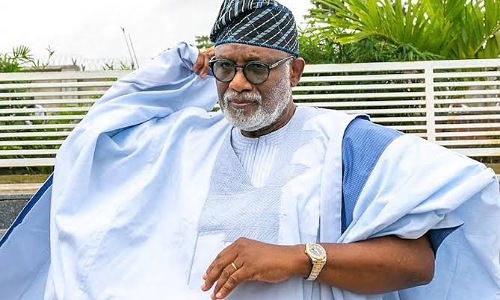
A tribute by Yemi Adeoye
Leaders are known in times of distress and unease, and this is one gentleman who distinguished himself excellently at such times.
I recall vividly the days of herdsmen attack accros the forests and villages of the southwest, Gen. Buhari was in charge, and as usual, unbothered.
So while many leaders in the APC refrained from commenting publicly on the very disturbing development for fear of the Presidency due to the President’s “Body language” Aketi rose to the occasion and spoke his mind freely as if he weren’t a member of the ruling party, and he was invisible.
He was a key figure in the formation of Amotekun to protect the southwest from.the marauding herdsmen, and when some naysayers argued that the regional vigilante force is not backed by law, Aketi as he’s fondly called rallied his state lawmakers to swiftly give the force a legal backing.
His experience as a legal practitioner also helped shaped the laws at the time. He spoke his mind freely at all times like an activist and not as a governor.
I came to know of him mainly when he became the NBA president, and got to meet him when i visited Akure to have a session with him for the Energie Platform show, as the leader of an oil producing state. The state was hosting the then VP, Prof Osinbajo and my dear brother Dapo Olumurphy Aruwajoye had extended an invite to my team and I for the session with Aketi.
We ended up not being able to have that session with him, so I decided to study whatever i could of the man Aketi, largely because of his positive demeanor and very playful nature. He sang, danced, hailed people freely and dressed casually to a formal event. I liked that almost Oshiomole dress-feel, but Aketi gat swag, plus a good smile.
There was no way I was gonn miss those. I got close enough to say hello, and he responded so warmly my interest in him grew. The Vice President was warm too, and kindly apologized for his inability to sit with us. It was sad, but their kindness was encouraging. Honestly ehn, this one pain me like he’s my relative walai.
Aketi was full of life, and a very bubbly guy, and you can’t but just love the guy. He is a people person, and you can easily notice that about him. He is not a regimented or scripted kinda guy, and easily relates, not as a governor, but as the boy next door. I think it’s his nature.
Due to his outspoken and fearless nature, he was unanimously picked as the Chairman Southern Governors Forum at a time when that body was beyond necessary, and that seat reserved only for the bold!
During the Presidential campaign when Asiwaju Tinubu visited ondo state at a time when his campaign wasn’t firmly consolidated, and even the Vice President was in the race, Aketi fearlessly described Tinubu as “Our own Capo di Tuti”
So it wasn’t a surprise when President Tinubu in his condolence message to the people and state of Ondo, described the late Governor as “My Fearless Brother” because no other word describes the late Governor Akeredolu better.
His last days and the controversies that ensued while he was incapacitated was painful to watch. But that wasn’t the man I saw and listened to for years. I strongly believe the controversies wouldn’t have been, if Aketi was in charge and control of himself.
I pray the state heal, and the new Governor focuses on uniting the state.and building on Aketi’s legacy. He picked him to be his Deputy. No matter what, that alone is telling.
Finally, find rest your excellency.
Adeoye wrote from the USA.

